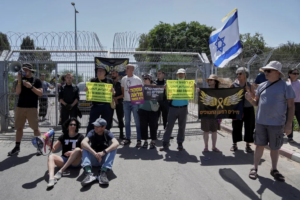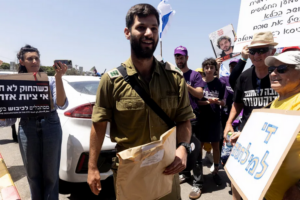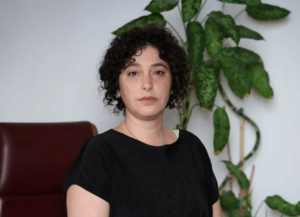‘Killing people needs to have some justification’: why IDF reservists are choosing jail over war

Relatives and supporters of Daniel Yahalom protest his detention outside a military base in central Israel, May 2025
Linda Dayan reports in Haaretz on 26 May 2025:
About 20 months into the war in Gaza, the Israeli military took a rare step.
Daniel Yahalom, a 32-year-old from Haifa, announced to his commanders earlier this month that after 230 days of reserve duty, he would not perform the 110 days he was summoned for, which were due to take place in the West Bank. When met with refusal – not uncommon as the war stretches on, and soldiers are called for unprecedented third and fourth rounds of service – the military usually cancels a reservist’s summons.
But in this case, after he stated that he would not be serving in the West Bank or the ongoing war in Gaza, the IDF brought Yahalom to trial. During his May 12 military trial, according to Kan News, Yahalom stated that he is “refusing, because I am no longer ready to take part in IDF activities in the West Bank, and because I view the current operation in Gaza as patently illegal. Therefore, I have the moral duty to refuse.” Yahalom was sentenced to five days in military prison – the first such sentence for a refuser in this current war.
Noa Levy, an attorney who works with refusers, advised Yahalom as part of Yesh Gvul, an Israeli movement supporting conscientious objectors and refusers. The movement’s name translates to “there is a border,” although the phrase is also colloquially used to mean “there is a limit” and “enough is enough.” She explains that it’s not unheard of for reservists to be jailed for not performing their duty, but it has become rare.
The first large-scale wave of refusal by IDF reservists came with the outbreak of the first Lebanon war in 1982, she says; that was when Yesh Gvul was founded. Refusers at the time were imprisoned, and many were also sent to military jail during the first and second intifadas.
She points to the establishment of Courage to Refuse, a movement that took root in 2002, in which about 50 reservists and officers signed a letter refusing to serve in the West Bank and Gaza on conscientious grounds. They did so, she says, out of a sense of patriotism: One of their mottos was “Refusing the occupation is Zionism.” They, too, served time.
But in the last 20 or so years, she says, there has been a decline in the number of reservists that the military is jailing. “It doesn’t mean that there weren’t any, but it means that it became a bit rarer,” she says. “I’d say not more than one a year.” In the year prior to October 7, she adds, just one reservist that consulted Yesh Gvul was sent to prison.

Ron Feiner, a reserve officer, was sentenced to 20 days in jail for refusing to return to active duty. On 25 May 2025, dozens of Israeli antiwar activists came to show their support for him at the entrance to a military prison
During wartime, she explains, the army’s policy – “And it’s a policy, not a law,” Levy stresses – was to grant exemptions to soldiers who refused their reserve duty. The army cancels their call-up and sends them home. “It’s not automatic,” she says. “They are called up to report for duty at a particular military base, and our recommendation to them is always to do so – to come, not to stay at home. They go to the base and they say, ‘I’m sorry, I refuse to do this.'”
Usually, she says, various officers speak to them throughout the day, threatening them with long prison sentences if they continue to object. “Eventually, in the 200 or so cases that Yesh Gvul has been consulting to date [since October 7], only one has been sent to prison.”
That one was Yahalom. “We think that this was an exception,” she says of his case.
In August and September, the army called up about 15,000 people who had previously been released from reserves. That brought in another wave of refusal. “Many of these people had already done some soul-searching,” she says. “They refused in big numbers.”
The officer overseeing his trial responded very intensely, which surprised even Yahalom’s direct commander. But despite threats of much longer stints in jail, he received a five-day sentence.
Levy says that this is not the most harrowing of punishments. Like reserve service, it tears people away from their daily lives, family and work, but military prisons are, in many cases, nicer than military bases, with televisions and private bathrooms. One of its main challenges is boredom and the confiscation of personal phones, which Levy describes as “a very hard rehab for most people.”
She met Yahalom after he was released. She says that he described his decision to go to jail rather than serve as one that gave him freedom. “After serving 230 days, they demanded he go for another 110 days in the occupied territory in West Bank,” she says. “He described thinking of being in another round of searches of private houses, humiliating children. He said, ‘If you think about that, I just sat in the room and read books all day for five days.’ That was, for him, an act of freedom.”
Last week, Ron Feiner, another reservist who had completed 270 days of service in the current war on the northern border and in Lebanon, was sentenced to 20 days in military prison after he refused to keep serving. An officer, he said that he had had doubts about the war during previous rounds of fighting.
“As it went on and intensified, I came to the realization that red lines were crossed,” Feiner told Haaretz last week. After he had signed a letter calling for an end to the war and the immediate return of the hostages, he said that his officer told him that he would no longer be able to serve in his post. But soon after, another round of reserve call-ups came. He told his commander that he would not be reporting for duty, and, like Yahalom, went to trial.
“I said that the values that led me to refuse are the same ones that led me to this difficult army service and to becoming an officer,” Feiner said. “I think the correct path is a deal that saves and brings back all of the hostages, and the right thing for me to do to make that happen is to no longer participate in the war and to refuse to report for reserves.”
Because Feiner did not report to his base before refusing, he was put on trial for absenteeism – a much more clear-cut crime, explains Levy, who says that Yesh Gvul advises against this. But Feiner notes that during his trial, the commander seemed more concerned with his refusal than how many days he had not shown up to base. Even so, he said that he does not regret his decision. “As I see it, this is another way to bring back the hostages and end the war.”

Attorney Noa Levy
Breaking point
Yahalom and Feiner – both of whom are combat soldiers who had done long stints in the reserves after October 7 – are not the image that usually comes to mind for most when they hear about refuseniks. “Most of the reserve refusers are not radicals,” says Levy. “Most of them are soldiers. Many of them are combat soldiers who served for many years and lost faith in the system right now, in this current round of fighting, which is very controversial in Israeli society.”
For some of them, this is a political endeavor – she cites Yuval Green, a combat medic in the reserves who started Soldiers for Hostages, the group that drafted the letter that Feiner eventually signed. Green told Haaretz last year that his own breaking point was when he was ordered to burn a residential building in Gaza that seemed to serve no security purpose. Other reservists, says Levy, returned from duty to international news reports saying that Israel is committing war crimes and cannot stomach being a part of it.
Many, like Feiner, point to the breakdown of the cease-fire in March, before its second stage, as the moment they knew they could not keep participating in the war. “All the hostages were supposed to be released, and Israel was the one that decided to return to battle,” Levy says. “Many of them said that this was a breaking point. Now they don’t see any kind of legitimacy to what they do there, and many of them had been conflicted, even during their service.”
She adds, “Most of them are not very political. Some of them see themselves as left wing. Some of them are not even directly referring to political opinions, but they just feel that fighting needs to have some justification. Killing people needs to have some justification, and they feel that they cannot do it anymore.”
About 200 reservists have turned to Yesh Gvul for support since the war began, but Levy says that there are many, many more that have not reached out to the organization. She believes that this is the biggest wave of refusal in Israel’s history. Due to the many rounds of call-ups, some have gone through the process of refusal three or four times.
Part of this is driven by the army’s decision, amid severe manpower shortages, to cancel service exemptions that they had previously given to otherwise fit reservists. In August and September, the army called up about 15,000 people who had been released from reserves. That brought in another wave of refusal, says Levy. “Most of these people are somewhere else in their life at the moment, and many of them had already done some soul-searching,” she says. “They refused in big numbers.” Now, Levy says, she receives dozens of calls a day from reservists seeking help. She also advises them in dealing with the military bureaucracy of being registered as a conscientious objector or other avenues of formal exemptions.
For Levy, in many ways, this is personal. “I personally refused my draft at 18 years old, so I didn’t even get to the point of reserve service in my life, and I became a lawyer 13 years ago. Since then, I help consult refusers as one of my main roots of activism.” She also co-founded the Mesarvot network, a movement that provides legal aid and support to teens who are refusing to draft for their regular service.
“The uptick in refusing reserve service seems to be one of the more uplifting ways in which the Israeli public is taking a stand against this illegitimate government and against the war. This is an illegitimate war that doesn’t serve the public in any way,” she says. “At the end of the day, the Israeli public needs to fight back against what this government is pushing them to do. The reservists are paying the highest price, and we can hope that the broader public won’t allow the killing to continue.”
This article is reproduced in its entirety
